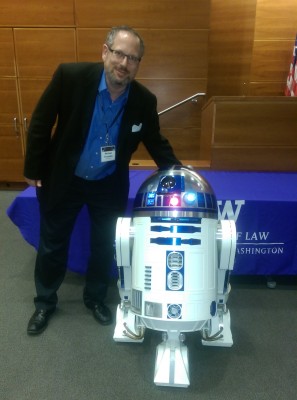It seems to get better every year.
But we’ll have a tough act to follow after the success of the 2015 edition!
It seems to get better every year.
But we’ll have a tough act to follow after the success of the 2015 edition!

I’m at We Robot 2015, aka the 4th Annual Conference on Robotics, Law & Policy at the University of Washington School of Law in Seattle, WA.
There’s a tremendous list of papers, and tonight we have a special presentation from Tony Dyson — the man who built R2-D2 for “Star Wars,” oversaw special effects for “The Empire Strikes Back” and builds robots for the world’s largest electronics companies.
It’s going to be great.
Plus, mark your calendar for next year: We Robot 2016 will be back at the University of Miami on April 1 & 2, 2016.
How many permissions does a meeting app need?
The American Association of Law Schools has an Android app to help guide the perplexed through the giant list of events that is its 2015 annual meeting.
The app seems to want a ridiculous number of permissions and I decided not to install it:
Version 1.0.0 can access:
- Device & app history
- retrieve running apps
- Identity
- find accounts on the device
- add or remove accounts
- Calendar
- add or modify calendar events and send email to guests without owners’ knowledge
- read calendar events plus confidential information
- Contacts
- read your contacts
- modify your contacts
- Location
- precise location (GPS and network-based)
- approximate location (network-based)
- Phone
- directly call phone numbers
- Photos/Media/Files
- modify or delete the contents of your USB storage
- test access to protected storage
- Camera
- take pictures and videos
- Device ID & call information
- read phone status and identity
- Other
- receive data from Internet
- pair with Bluetooth devices
- access Bluetooth settings
- full network access
- view network connections
- control vibration
- prevent device from sleeping
- run at startup
- use accounts on the device
- send sticky broadcast
- delete all app cache data
Not to mention that “Updates to AALS2015 may automatically add additional capabilities within each group.”
I’m disappointed that the AALS hasn’t offered an app that is more sensitive to the privacy interests of attendees. What possible functionality does it offer that needs all this?
There is also an iPhone version – no idea if it’s better behaved.
I’ll be chairing a panel on “Automated Decision-Making” at the AALS’s Jan 2015 conference. It’s co-sponsored by the Section on Internet and Computer Law and the Section on Defamation and Privacy.
Please come by and say hello, or send an email and maybe we can meet up some other time. One of the good things about the AALS is a chance to see old friends and it’s been a while since I went to one.
The panel, Saturday at 10:30am, should be well worth your time:
Proliferating sensors, affordable data storage, indiscriminate personal data collection, and increasingly robust predictive algorithms individually raise issues related to privacy, security, and due process. Combined, however, these technological advances have created a nearly insatiable appetite for data in order to improve organizational decision-making. The domains across which this voracity reaches include consumer lending, insurance, advertising, legal compliance, national security, and employment.
Automated decision-making promises accuracy and efficiency, but it is also rife with peril. Humans irrationally trust decisions made by computers, even though bias is easily hard-wired into computer systems. The use of personal data to make extremely nuanced and particularized decisions raises a number of privacy concerns. Incorrect inputs risk correspondingly erroneous outputs. Automated decision-making could also have a disparate impact on vulnerable populations that are susceptible to certain kinds of influence or that find it hard to fight back. Compounding this problem is the almost complete lack of meaningful transparency for those subjected to automated decisions.
Policy makers are struggling to respond to the challenges posed by automated decision-making. This panel will explore those challenges and will attempt to identify similarities and differences among the varied domains in which automated decision-making operates.
Moderator:
A. Michael Froomkin, University of Miami School of Law
Panelists:
- Meg Leta Ambrose, Georgetown University School of Communication, Culture & Technology
- Frank Pasquale, University of Maryland Francis King Carey School of Law
- Dennis D. Hirsch, Capital University Law School
- Michael Rich, Elon University School of Law
DATE: Saturday, 1/3/2015
TIME: 10:30 am-12:15 pm
ROOM: Thurgood Marshall West, Mezzanine Level, Marriott Wardman Park Hotel
From Anonymity to Identification: Online Communication in a Time of Surveillance | Prof. Michael Froomkin (Audio: MP3) (Video: MP4 / OGV)
I can’t thank my hosts in Heidelberg enough for the warmth of their welcome and their kindness while we visited.